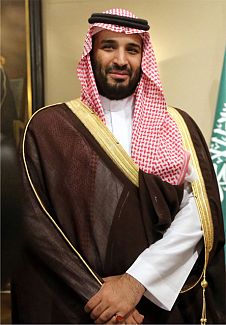HRH Crown Prince Mohammed bin Salman Al-Saud is the Crown Prince and Prime Minister of Saudi Arabia and is widely acknowledged as the de facto ruler of the Kingdom.
Birth: 31 August 1985 (Age: 39)
Source of Influence: Political
Influence: De facto ruler of Saudi Arabia
School of Thought: Sunni, Salafi, Moderate Salafi
Status: Featured in current year
HRH Crown Prince Mohammed bin Salman Al-Saud is the Crown Prince and Prime Minister of Saudi Arabia and is widely acknowledge as the de facto ruler of the Kingdom.
Rapid Appointments: At the beginning of 2015, Prince Mohammed bin Salman was largely unknown in political and diplomatic circles. Since his father’s accession to the throne in January 2015, Prince Mohammed has been swiftly appointed to a number of powerful positions. He was first appointed Minister of Defence, and also named Secretary General of the Royal Court. Then Prince Mohammed was named the chair of the Council for Economic and Development Affairs and was given control over Saudi Aramco by royal decree. In June 2017, he was appointed as Crown Prince of the Kingdom following his father’s decision to remove Prince Mohammed bin Nayef from all positions. In 2022, he was appointed Prime Minister, a post traditionally held by the King.
International Relations: Diplomatic progress has been made with regards to Yemen, Syria and Iran. The Crown Prince has also successfully managed relations with the West despite issues surrounding the Khashoggi murder and the Ukraine war. The Saudi Arabia Public Investment Fund has spent $6.3 billion in sports deals since early 2021, investing heavily in golf, football and sporting events. Some have levelled accusations of “sportswashing”, whilst others welcome this engagement.
Catalyst of Change: The Crown Prince has been linked to major changes taking place in the Kingdom: allowing women to drive, holding their own passports and moving independently, the (re)opening of cinemas and holding of pop concerts, a crackdown on corruption (including the arrest of princes and prominent businessmen), and the proposal to float Saudi Aramco, to mention a few.
Vision 2030: As Chairman of the Council of Economic and Development Affairs, Crown Prince Mohammed bin Salman launched “Vision 2030”, a comprehensive, multi-year plan for the future of Saudi Arabia. The ambitious plan seeks to revitalize the Saudi economy by bolstering the Kingdom as a global investments powerhouse, and moving away from oil-dependency as the largest source of national income. It also seeks to strengthen government efficiency and the promotion of a “tolerant, thriving and stable Saudi Arabia that provides opportunity for all”. Mega projects such as Neom, the 175-km “line city” is a statement of forging its own path.
The Khashoggi Assassination: Jamal Ahmad Khashoggi was a prominent journalist and Saudi Arabian dissident who was assassinated at the Saudi consulate in Istanbul on 2 October 2018. Although the Saudi government denied any knowledge of the murder, they were later forced to admit that their officials had been involved but didn’t go as far as the CIA who concluded that Crown Prince Mohammad bin Salman had ordered Khashoggi’s assassination.
Donations: The Crown Prince oversees regular donations to causes both home and abroad. In 2019, he donated $1 billion to the Misk Foundation to support youth empowerment and social development in Saudi Arabia and the Arab world. In 2022 he donated $13 million to the National Platform for Charitable Work (Ehsan) in Saudi Arabia, $203 million to Jordan as a host of refugees and over $500 million to support the UN Humanitarian Response Plan for Yemen.
“All success stories start with a vision, and successful visions are based on strong pillars.”
200 thousand years of human habitation in the kingdom
$500 billion the cost of Neom



